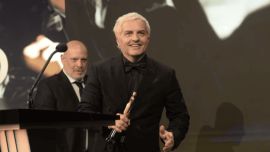Centro de Estudios Legales y Sociales (Centre for Legal and Social Studies, CELS) celebrated its 40th anniversary last Sunday with a raucous gathering of musicians, artists and activists at the Estadio de Malvinas Argentina in La Paternal, Buenos Aires. The organisation, established in 1979, was founded by Emilio Mignone during the darkest years of Argentina’s dictatorship. Mignone, a devout Catholic and lawyer, began documenting human rights abuses after the disappearance of his daughter in 1976. Mónica was one of the thousands abducted by the military junta. The question of her whereabouts remains unsolved. CELS was born out of Mignone’s belief in the need to document abuses carried out by the State, chronicle the scale of the institutional violence and, as a lawyer himself, provide legal counsel to those in need. His co-founders, many of whom also had family members kidnapped by the regime, were at the frontline of the fight against the dictatorship and were vocal advocates for ushering in a new era of democracy after its demise. Decades on from his death in 1998, Mignone remains a lauded defender of human rights in Argentina’s history. And the organisation he led for so many years as president, meanwhile, is going from strength to strength. “CELS is one of the most recognisable human rights organisations in this country, doing real on-the-ground work locally,” said Mariela Belski, executive director of Amnesty International Argentina.
‘CONTINUITY’
Today, CELS works to confront human rights abuses and the degradation of dignity across a wide range of issues, its Executive Director Gastón Chillier told the Times.
“Though it’s been 40 years, there are still great lines of continuity from our origins to the present day, and our commitment to justice continues,” he said in an interview
Sunday’s festival, which carried the name “Imparable,” or “Unstoppable,” was testament to that work. Leaders from all across the human rights spectrum came out for the occasion and recommit to the cause.
On one hand, the event was a strong sign of support for the fights that remain ahead. One the other, it was a celebration of all the work that’s been done and the community that’s been built around furthering the human rights agenda in Argentina, a country that’s regionally considered to be a trendsetter in this area, according to Belski.
Musical acts like La Bomba del Tiempo and La Delio Valdez performed, while street artists and muralists like Ailén Possamay created new work in real time. Bringing art into the festival highlighting the synergy between the two, how art can function as cultural commentary and a shining example of self-expression.
Debates and panels discussed broad topics like the future of the movement and the legacy of the dictatorship, as well as more policy-specific initiatives like the right to work, the reduction of security forces, the legalisation of abortion and prosecuting crimes against humanity.
In addition to its more obvious line of work, CELS has, in recent years, taken its fight toward what it calls the “recuperation of democracy.” The organisation has been a vocal critic of outgoing President Mauricio Macri’s government, and it has been a plaintiff in a number of court cases against other Argentine administrations in its capacity as a human rights organisation.
At times, this has opened the door for critics to try and paint the group as too partisan. It’s a concern Chilliers says he has heard, but not one that he feels particularly defensive about.
“Our founders were people with political causes, yes [...],” he said. “[But] today, we have an agenda of values, not an agenda of partisan politics.”




















Comments